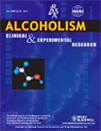The aims of this study were to determine whether alcohol consumption or cessation influences transient elastography (TE) measurements and whether TE is a useful tool to monitor alcoholic patients.
Twenty-three consecutive heavy drinkers (20 men and 3 women; mean age 47.2 years) admitted for a 7-day hospitalization for alcohol detoxification were included. On admission (D0), a detailed medical history was taken and the following laboratory tests were performed [aspartate aminotransferase (ASAT), gamma glutamyltransferase (γGT), and carbohydrate-deficient transferrin (CDT) levels, and Fibroscan®]. All examinations were repeated on D8, D30, and D60. Variation in the median Fibroscan value of >20% was considered significant.
After 1 week of detoxification, the % variation in TE was −21.67 ± −27.6%. The median variation in TE between D8 and D60 was −20% in the abstinent group and 32% in the relapse group (p = 0.007). An increase in proportion of patients with a significant decrease in TE was observed with an increased duration of abstinence: 41.7% at D8 and 66.7% at D60. TE values were significantly correlated with ASAT, γGT, and CDT at D0 and D8, and with ASAT and γGT at D60.
TE in alcoholics is influenced by major variations in the biochemical activity of the disease. The kinetics of variation of TE suggest that this method may be useful to assess alcohol abuse and control.
Read Full Abstract
Rerquest Reprint E-Mail: gelsi.e@chu-nice.fr
Read Full Abstract
Rerquest Reprint E-Mail: gelsi.e@chu-nice.fr
